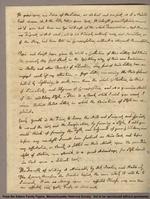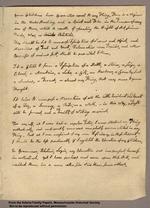Philadelphia July 7, 1776
It is worth the while of a Person, obliged to write as much as I do, to consider the Varieties of Style .... The Epistolary, is essentially different from the oratorical, and the Historical Style .... Oratory abounds with Figures. History is simple, but grave, majestic and formal. Letters, like Conversation, should be free, easy, and familiar.
Simplicity and Familiarity, are the Characteristicks of this Kind of Writing. Affectation is as disagreable, in a Letter, as in Conversation, and therefore, studied Language, premeditated Method, and sublime Sentiments are not expected in a Letter. Notwithstanding which, the Sublime, as well as the beautifull, and the Novel, may naturally enough, appear, in familiar Letters among Friends. -- Among the ancients there are two illustrious Examples of the Epistolary Style, Cicero and Pliny, whose Letters present you with Modells of fine Writing, which has borne the Criticism of almost two thousand Years. In these, you see the Sublime, the beautifull, the Novel, and the Pathetick, conveyed in as much Simplicity, Ease, Freedom, and Familiarity, as Language is capable of.
Let me request you, to turn over the Leaves of the Praeceptor, to a Letter of Pliny the Younger, in which he has transmitted, to these days, the History of his Uncles Philosophical Curiosity, his Heroic Courage and his melancholly Catastrophe. Read it, and say, whether it is possible to write a Narrative of Facts, in a better Manner. It is copious and particular, in selecting the Circumstances, most natural, remarkable and affecting. There is not an incident omitted, which ought to have been remembered, nor one inserted that is not worth Remembrance.
Page 2
It gives you, an Idea of the Scaene, as distinct and perfect, as if a Painter had drawn it to the Life, before your Eyes. It interests your Passions, as much as if you had been an Eye Witness of the whole Transaction. Yet there are no Figures, or Art used. All is as simple, natural, easy, and familiar, as if the Story had been told in Conversation, without a Moments Premeditation.
Pope and Swift have given the World a Collection of their Letters; but I think in general, they fall short, in the Epistolary Way, of their own Emminence in Poetry and other Branches of Literature. Very few of their Letters, have ever engaged much of my Attention. Gays Letter, concerning the Pair of Lovers kill'd by Lightning, is worth more than the whole Collection, in Point of Simplicity, and Elegance of Composition, and as a genuine Model of the epistolary Style. There is a Book, which I wish you owned, I mean Rollins Belles Letters, in which the Variations of Style are explained.
Early Youth is the Time, to learn the Arts and Sciences, and especially to correct the Ear, and the Imagination, by forming a Style. I wish you would think of forming the Taste, and judgment of your Children, now, before any unchaste Sounds have fastened on their Ears, and before any Affectation, or Vanity, is settled on their Minds, upon the pure Principles of Nature ....Musick is a great Advantage, for Style depends in Part upon a delicate Ear.
The Faculty of Writing is attainable, by Art, Practice, and Habit only. The sooner, therefore the Practice begins, the more likely it will be to succeed. Have no Mercy upon an affected Phrase, any more than an affected Air, Gate, Dress, or Manners.
Page 3
Your Children have Capacities equal to any Thing. There is a
Vigour in the Understanding, and a Spirit and Fire in the Temper of every one of them, which is capable of ascending the Heights of Art, Science, Trade, War, or
Politicks.
They should be set to compose Descriptions of Scaenes and Objects, and Narrations of Facts and Events, Declamations upon Topicks, and other Exercises of various sorts, should be prescribed to them.
Set a Child to form a Description of a Battle, a Storm, a seige, a Cloud, a Mountain, a Lake, a City, an Harbour, a Country seat, a Meadow, a Forrest, or almost any Thing, that may occur to your Thoughts.
Set him to compose a Narration of all the little Incidents and Events of a Day, a Journey, a Ride, or a Walk. In this Way, a Taste will be formed, and a Facility of Writing acquired.
For myself, as I never had a regular Tutor, I never studied any Thing methodically, and consequently never was compleatly accomplished in any Thing. But as I am conscious of my own Deficiency, in these Respects, I should be the less pardonable, if I neglected the Education of my Children.
In Grammar, Rhetoric, Logic, my Education was imperfect, because unmethodical. Yet I have perhaps read more upon these Arts, and considered them in a more extensive View than some others.



